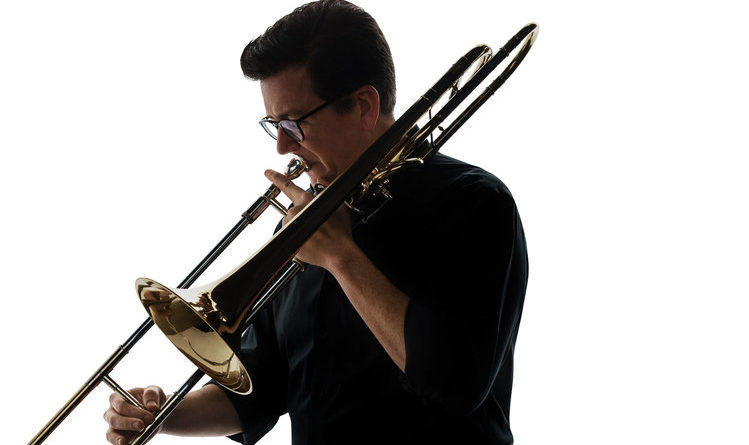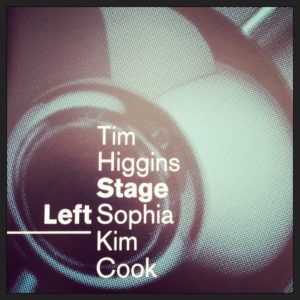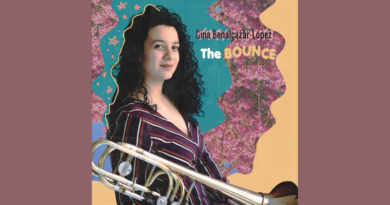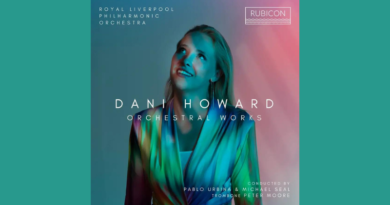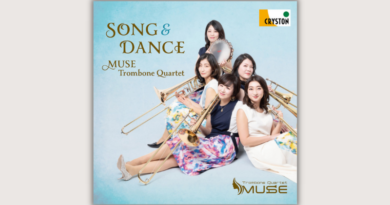Tim Higgins and His Trombone Concerto: The Interview
In the inaugural season of conductor Esa-Pekka Salonen, the San Francisco Symphony [SFS] is planning for an unforgettable beginning to this new chapter in the orchestra’s history. With all the music on the docket, one piece stands out for brass players – a trombone concerto written by the featured soloist.
Principal Trombonist Tim Higgins can be considered a “triple threat” in the music world. As a performer, he has held the San Francisco Principal Trombone position since 2008. Before joining San Francisco, Higgins was a member of the National Symphony Orchestra and has performed with the Chicago and Baltimore orchestras – among many others. As an educator, Higgins teaches at both the San Francisco Conservatory of Music [SFCM] and Northwestern University, his alma mater. But the real craft that elevates Higgins above the others is his compositional skills. His writing talents have led his works to be performed by some of the greatest brass players of this generation.
Last Row Music had the great opportunity to ask Tim Higgins about his upcoming trombone concerto and his process leading into the premiere performance.
LRM: When were you approached by the SFS to write a trombone concerto?
Higgins: MTT [Michael Tilson Thomas] and the Artistic department approached me about this project in January. Michael has always been an advocate for his orchestral musicians, and he has regularly checked in with me on any compositions I’ve been working on over the years. Recently, MTT and I were discussing concertos to program for this concert in October and he came up with the idea for me to write a piece.
When did you begin your career as a composer and arranger?
I’ve been arranging music since college. My brass quintet and trombone quartet were open to the idea of playing transcriptions, and they let me bring in different pieces from time to time. Eventually, it became normal for me to arrange music for all my chamber groups. Composition began when I moved to SF [San Francisco]. Out of curiosity, I wanted to see what it was like to write a piece of music for brass ensemble. As performers, we are limited to the interpretation of music, not the creation of music. It was interesting to be responsible for crafting the narrative of a composition. From there, it became an artistic outlet I really enjoyed.
What and/or who influences your compositional style?
I’m fortunate enough to be performing a masterwork nearly every week of the SFS season. There have been countless times in the orchestra when I’m trying to figure out when a great composer chose certain harmonies or modulations. It’s been quite an education so far in problem-solving through composition or orchestration. Overall, I’m very influenced by the Russians and Eastern Europeans, though that might not be apparent in my music. Depending on what type of piece I’m writing, however, there can be influences from Bruckner, Bach, Copland or Ligeti, to name a few.
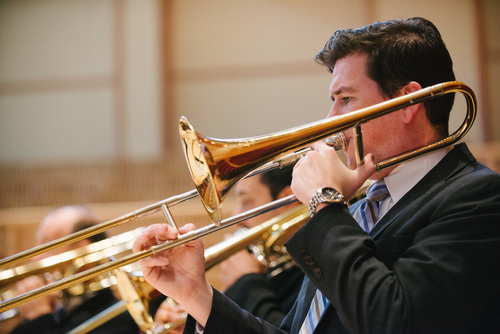
Even though you are an active composer, are there certain composers you are studying in preparation for this concerto?
I’ve been thinking a lot about Ravel’s Piano Concerto in G, one of my all-time favorite concertos. The opening bars of my concerto are a tribute to that work. I took a lot of inspiration from the form and simplicity of Ravel’s concerto, even though that is probably not apparent in my work.
With playing in the SFS and teaching at SFCM and Northwestern, how are you finding time to write the concerto?
It’s been a challenge, and I have an incredibly supportive wife. When I agreed to write the concerto, our son was due to be born just one month later. I took all the free time I could manage before his birth to write, and luckily finished the work prior to his arrival. Some days I’d write for a handful of minutes, and on other days, I’d be gone for 5-6 hours. Creativity is not linear, and I’m very lucky to have a partner who is flexible with the chaos!
Are you finding any advantages or challenges with being the performer and writing your own concerto?
The biggest advantage is that I don’t have to write anything I know I can’t play! I can tailor this work to my strengths, which is a lucky position to be in as a soloist. My goal is to write a work for the trombone community that is playable and worth the challenge of working up for performance. There is an aspect to performing this piece that will be very unique for me: with any other solo recital, whenever there is an interlude without my solo line, the audience listens to someone else playing someone else’s music. It occurred to me while writing this that I’m going to feel like I’m performing even while the solo line is resting. When I’m not playing, the audience is still listening to me. It’s a very bizarre concept, and I’m not entirely sure what that will translate to during the performance.
Click here to learn more about the concerto and the dates of performance.
